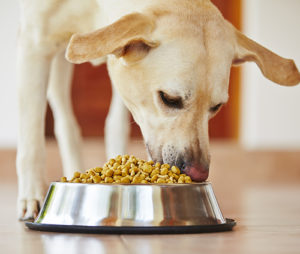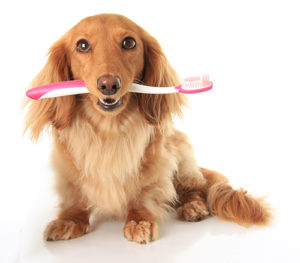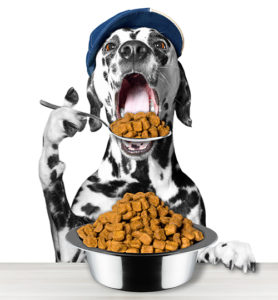Your Dog’s Diet Influences His Oral Health
This post may contain affiliate links. If you make a purchase through these links, I will earn a commission at no extra cost to you. Thanks for reading!
 Let’s face it. Your dog is your BFF.
Let’s face it. Your dog is your BFF.
And he wants you to know it. Every time you come into the room, your dog can hardly contain himself. His happiness overflows. It doesn’t matter if you were gone all day at work or you just went into another room and closed the door for five minutes. When he sees you, he greets you with an overwhelming display of joy.
Don?t you want to show your best friend how important he is to you? Well, one way that he might not particularly like, but which will keep him healthier longer is to take care of his smile.
Your Dog’s Oral Health
It?s common knowledge that humans need to brush and floss their teeth regularly to keep their teeth, tongue, and gums in good condition. In fact, recent research on humans shows a link between a person?s oral health and his risk of heart disease.
The same is true for dogs. Yes, good oral health can have the same profound effect on dogs. Brushing your dog?s teeth will pay off with a lower risk of heart disease later in life.
Dry Food Is Best
 Yes, brushing your dog?s teeth regularly will help to keep plaque and tartar from becoming an issue. Your dog might not like it. In that case, you could try wiping his gums with a clean, damp cloth. Doing that can be beneficial as well.
Yes, brushing your dog?s teeth regularly will help to keep plaque and tartar from becoming an issue. Your dog might not like it. In that case, you could try wiping his gums with a clean, damp cloth. Doing that can be beneficial as well.
But did you know that your dog?s diet can influence his oral health? Do you normally feed him canned food? Or dry food? What kind of treats and favorite toys do you provide for your pet? All of these things have an effect on the likelihood of trouble with your pet?s teeth and his overall health.
Feeding dry dog food rather than a moist canned variety is best for your dog. The hard surface of dry kibble rubs against the teeth to remove and reduce plaque.
Don?t add water or gravy to the dry food. The simple act of moistening dry dog food defeats the ability of the kibble to reduce plaque.
Buy the best dry food that you can afford so that your BFF will get a balanced amount of everything his body needs. When your dog?s diet is nutritionally sound with essential vitamins, nutrients, and enzymes, your pet?s oral health will be at its very best.
How About Treats?
The treats your pet consumes are part of your dog?s diet just like snacks are part of a person?s diet. As humans, we like to overlook our snacking habits???as if the snacks don?t count.
In the same way, we may easily overlook the treats we give our dogs. This is not a good idea. Carefully consider any and all items your dog consumes.
Do you give your dog bones, rawhide, jerky treats, or dog biscuits?? Maybe your pet prefers greenies or corn starch chews. You may not have considered it, but tossing Spot a rawhide chew is like giving him a candy bar. The rawhide that is often provided between meals contains calories that need to be counted in your dog’s daily total.
Many dog experts discourage people from giving their dogs a treat made from rawhide because of all the toxic chemicals it contains as a result of the tanning process.

And don?t forget that many of the treats and snacks you provide in your dog?s diet can be just empty, wasted calories???kind of like the snacks we humans like to devour. Other treats, though, provide excellent opportunities to improve oral health. Greenies, raw bones, and hard dog biscuits all help to keep tartar at bay. Softer snacks do not provide that same benefit. And there are some treats that can also prevent your dog from having bad breath.
So be sure to recognize that your dog?s diet must be healthy to ensure excellent oral health. Dry dog food is best whenever possible. And don?t forget to select treats that will enhance your dog?s diet instead of damaging it. Consciously monitoring your dog?s diet will positively influence your best friend?s oral health and help to prevent health problems later in life.
Are you watching out for your dog’s oral health?



